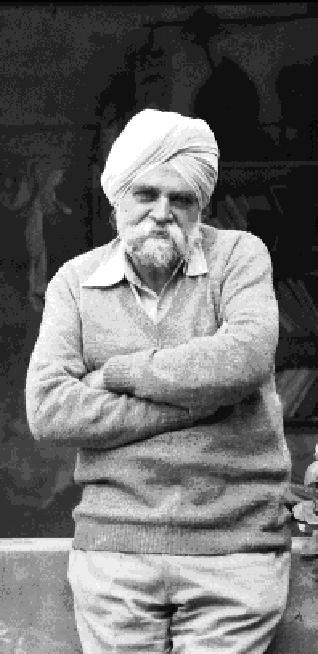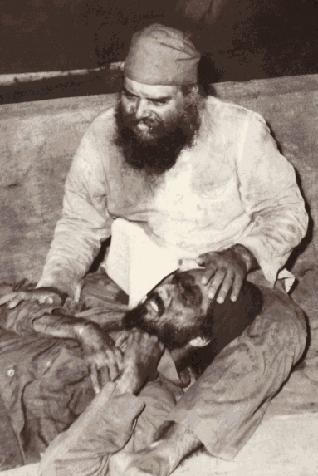
Above: detail from photo by Amarjit Singh Chandan, taken at Gursharan Singh's home, 'Guru Khalsa Niwas', in Putli Ghar, Amritsar (1986). Below: Gursharan Singh with an unknown actor in a play based on an English drama on mine workers (Amritsar, 1973).

Film/Stage
Gursharan Singh: His Punjabi Theatre Changed Minds
by SARIKA SHARMA
GURSHARAN SINGH, Director, Punjabi Theatre. Born in Multan, Punjab, on September 16, 1929. Passed away in Chandigarh, Punjab, on September 27, 2011.
“It is a long battle, the battle of changing mindsets,” Gursharan Singh, who has died aged 82, once said of his theatre movement.
It exhausted some, some drifted away, and some are still fighting on. But he was never bitter. “None of them was an opportunist, none was dishonest,” he said.
For some time now, his audience had been limited by his family and near ones. It was easy to provoke him to speak; but nobody could stop him, and he would have to be taken for dialysis much sooner.
They say it takes a moment to shape a hero. For Gursharan Singh, that moment arrived five decades ago at the Bhakhra Dam site in Nangal, Punjab, when looking at the gushing Sutlej waters, he wondered if, like these waters, it was possible to change the course of people’s thoughts.
Little did anyone realize that “laboratory wala” Gursharan Singh, an engineer at the hydro project, would soon weave a cultural revolution in Punjab. And a new genre of theatre called Tharra theatre.
'Tharra' is Punjabi for ‘platform’, and he performed wherever he found one.
From villages in rural Punjab to the corridors of power in Delhi, he took his voice of dissent everywhere. Thanks to him, even the unlettered in Punjab know what theatre is.
While some critics termed his theatre as an “artless slogan”, Gursharan never talked finesse. His theatre was for the betterment of society. He was the one who forced the state to make mention of the mother’s name in school certificates necessary. When youngsters were being killed by the police in fake encounters during the Naxalite movement in the 1970s, he questioned the state’s acts through Kiv Koorrey Tuttey Paal; when the freedom to express had been snubbed during the Emergency, he came up with the play Bund Kumre and was put behind bars in September 1976 for a while; when state terrorism was silencing every voice of dissent, he challenged them by staging Hit List in Amritsar.
He was a strong follower of Guru Nanak’s rationalist thinking.
His theatre group also produced some world classics by Bertolt Brecht and Samuel Beckett in Punjabi, and he himself penned some of the most memorable dramas written in Punjabi language. But he declared that “elite theatre” is not suitable for the poor masses of India, and that the need of the time was to develop a theatre that pays heed to the limitations of rural society.
After him, there are many who are taking forward his legacy. Veterans like Ajmer Singh Aulakh too credits Gursharan Singh for inspiring him.
“It is a sad day but there are many who will take Gursharan Singh’s legacy forward.”
Gursharan Singh was criticised for following the leftist ideology by veterans like Balwant Gargi and Surjit Singh Sethi. But he believed party politics was a different thing, and it was important for one to have an ideology.
As the word spread about Gursharan Singh’s death, people from every corner of [East] Punjab wanted to make it to the cremation. And they all walked towards his house - members of labour organisations raising red flags, farmers with green flags, writers, young theatre artistes - renting the air with the slogan: Long Live Gursharan Singh.
[Courtesy: The Daily Post, Chandigarh, Punjab. Edited for sikhchic.com]
September 30, 2011
Conversation about this article
1: Satvir Kaur (Boston, MA, U.S.A.), September 30, 2011, 8:34 AM.
I remember watching Bhai Manna Singh (Gursharan Singh) with our entire family glued to the television. Our grand-uncle loved Bhai Manna Singh's creations so much he would always refer to my brother as Bhai Manna Singh. He will be dearly missed!
2: Baldev Singh (Bradford, United Kingdom), September 30, 2011, 6:01 PM.
Changing the mindset of Indians is a tall order and people like Gursharan Singh were just continuing the inculcation of the social justice of our Gurus.
3: Jannat J. Singh (United Kingdom), January 14, 2012, 10:03 AM.
I'm writing a book on Punjabi cinema. Perhaps someone can direct me to a few books. This is the first time I've heard of Gursharan Singh.


